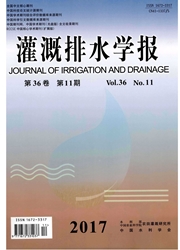

 中文摘要:
中文摘要:
为了探寻符合平原河网地区特点的排水系统最佳布置及管理方案,根据江苏常熟稻田排水观测试验,结合田间水文模型-DRAINMOD模型,分析了河网地区独特的水量平衡关系,确定了稻田排水量以及农田与外河的交换水量,并根据研究区的排水要求计算了可以削减的排水量。结果表明,在现有灌排制度下,生长期内稻田实际排水量约816mm,远高于当地所推荐的适宜排水量,可削减排水量约216mm,占目前灌水量的21.4%;按照当地所推荐的适宜排水量,利用DRAINMOD模型,当暗管埋深为90cm时,排水间距以25m为宜。研究区农田与外河的水位差较小,当外河距离农田大于30m时,实际水量交换很小;外河对农田的影响主要表现为对农田排水系统功能的抑制作用。
 英文摘要:
英文摘要:
In order to study the optimal drainage system design and management,the experiments were conduceted to study the drainage processes and its influence by the adjacent channels in paddy fields in Changshu,Jiangsu province based on field observations and DRAINMOD simulations.The results showed that with frequent irrigation,the total drainage from the paddy fields in the growing season was 816 mm,which was far greater than the recommended value,and the reduced drainage depth of 216 mm accounted for 21.4% of the current irrigation depth.With the recommended drainage depth as target value,for drains buried at 90 cm deep,the maximum drain spacing was 25 maccording to DRAINMOD simulations.When the distance between the stream channels and the farmland was greater than 30 m,the amount of exchange water between them was very small,which could be neglected for general consideration.The main impact of the stream channels on farmland hydrology was suppressing subsurface drainage capacity of the farmland drainage systems.
 同期刊论文项目
同期刊论文项目
 同项目期刊论文
同项目期刊论文
 期刊信息
期刊信息
